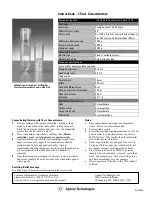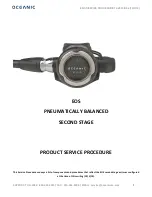
30,000 Molecular Weight Cut-Off (MWCO)
15 mL Spin Concentrator, Part No. 5188-2799
05/2004A
Instructions – 15 mL Concentrators
Equipment required
15 mL Spin Concentrators, pack of 10
Centrifuge
Rotor type
Swing bucket or Fixed angle
Minimum rotor angle
25°
Rotor cavity
To fit 30 x 114 mm conical bottom tubes or
29 x 104 mm round bottom tubes (50mL)
Minimum effective speed
1,000 g
Recommended speed
2,000 g
Maximum speed
3,000 g
Concentrate recovery
Pipette type
Fixed or variable volume
Recommended tip
Thin gel loader type
Technical specifications
Concentrator sample volume capacity
Swing bucket rotor
2-15 mL
Fixed angle rotor
2-8 mL
Dimensions
Total Length
76 mm
Width
25.5 mm
Active Membrane Area
4 cm
2
Hold-up volume of membrane
<20 µL
Dead stop volume
50 µL
pH range
pH 1 – 9
Materials of construction
Body
Polycarbonate
Filtrate vessel
Polypropylene
Concentrator cap
Polycarbonate
Membrane
Polyethersulfone
Concentrating Proteins with 15 mL Concentrators:
1
Fill concentrator with sample within the working volume
capacity range noted in the table above, taking care not to
touch the membrane surface, and then close the hinged lid
(ensure that the lid is fully seated).
2
Place concentrator into 50 mL centrifuge tube
(filtrate
collection vessel – not supplied, user must provide)
.
3
Insert assembled concentrator into centrifuge (when fixed
angle rotors are used, angle the concentrators so that the
printed windows face upwards/outwards). Spin at
recommended speeds, taking care not to exceed the maximum
g force indicated in the table above (20-40 minutes is
common).
4
Once the desired concentration is achieved, remove assembly
and recover sample from the bottom of the concentrate pocket
with a pipette.
Desalting/Buffer Exchange
See 4 mL Spin Concentrator instructions on the reverse side.
Notes:
·
Spin concentrators are single use disposable
items. Re-use is not recommended.
·
For research use only.
·
Select the most appropriate membrane cut-off for
your sample. For maximum recovery, select a
MWCO at least 50% smaller than the molecular
size of the species of interest.
·
These concentrators are designed for use with
biological fluids or aqueous solutions only, not
for organic solvents or strong acids or bases.
·
Flow rates are affected by MWCO, porosity,
sample size, concentration, viscosity, centrifuge
force, and temperature. Adjust centrifuge force
and time accordingly for your samples.
·
Do not autoclave. Sterilize with a 70% ethanol
solution.
For more information or technical assistance,
Agilent Technologies, Inc.
please call toll free: 1-800-227-9770 or visit
2850 Centerville Road
our web site at: www.agilent.com/chem/bioreagents
Wilmington, DE 19808-1610 USA




















